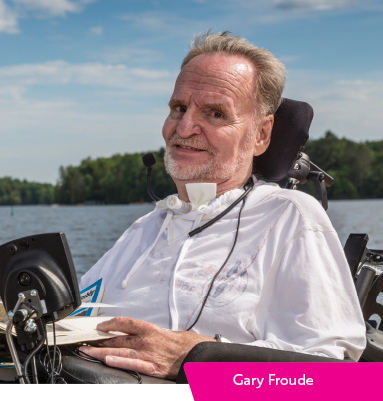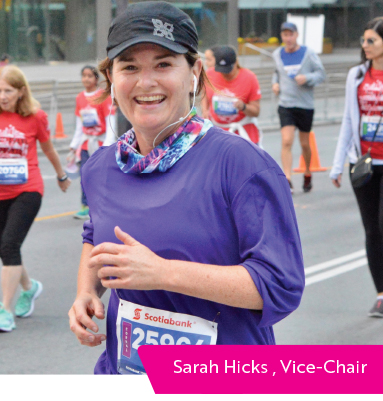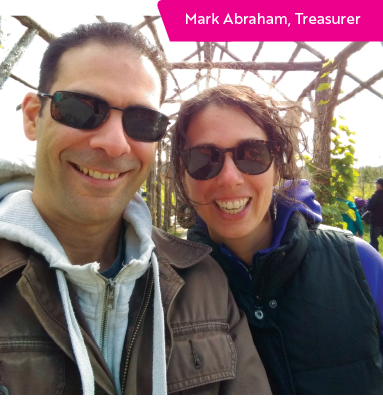At SCIO our Board of Directors is a diverse group of individuals that represent our community in a variety of ways; through the skills and resources they offer to support our mission; their experience as a person with a disability; their professional insights into our services and activities; and their ability to develop strategic alliances and partnerships. We have the honour of working with talented, dynamic and caring individuals who generously give their time and expertise to sit in the crow’s nest of our ship with a view to the future.
We approached three of our Board members; Gary Froude, Sarah Hicks and Mark Abraham to ask them to share their thoughts on a few questions.

Gary Froude is a Muskoka transplant arriving a short 20 years ago coming surreptitiously from an environmental project in Costa Rica and a musical project in Africa. He became managing director of the Muskoka Lakes Music Festival which evolved into an international Chautauqua with Gary at the helm and chaired the national Arts Network for Children and Youth for several years.
Gary was one of the first presidents of a newly formed Rotary Club in Muskoka Lakes, is a multiple Paul Harris Fellow and has been Secretary of a leading-edge, affordable home ownership project since its inception. He chaired the Board of Muskoka Tourism for several years and led Muskoka in the development of a new provincial tourism structure and chaired the Board of the newly formed Explorers’ Edge. In 2012 Gary was honoured to receive the Muskoka Citizen of the Year award.
In 2013 he was paralyzed by an unknown virus and was introduced to the field of health care as he gained insight into the challenges of complex continuing care in the province and in Muskoka. Gary has been bringing the patient voice to the table as a member of the Muskoka Area Health System Transformation Executive Committee, the Critical Care Council of Ontario and as co-chair of the MAHST Community Engagement Workstream. He sits on the PFAC for two Muskoka hospitals. He also sits at the Digital Health Advisory Council, a three LHIN collaboration tasked by OHT to put together the Digital piece of the new Ontario Health Teams. Gary and his partner Gayle are active members of their community, striving for positive change and valuing the quality of life.
QHow did you first get involved with SCIO & what drove your engagement in SCIO to the level of wanting to serve on the board?
My wife Gayle was the first to have contact with SCIO as I was not really able to speak at the time. In the ICU of Royal Victoria Hospital in Barrie Gayle met Heather Hollingshead who Gayle calls her angel. Heather guided Gayle through the system and today seven years later is still an incredible resource. I am not big on the concept of “Giving Back” however I am large on “Giving” and I find SCIO to be very worthy of my time and effort.
QWhat has been the biggest success for SCIO during your tenure? What has been the most difficult challenge?
I think the biggest personal success for me since joining the organization has been sitting around the table with such a committed and diverse group of individuals, offering what input I have and feeling that input valued. The largest challenge for me, like so many others, is the climate change created by this nasty COVID-19 pandemic, limiting personal contact. I feel that not only the Board, but the entire organization has done an exemplary job of keeping everyone in the loop however that opportunity for fellowship is much missed.
QWhat advice would you give to someone who was thinking about joining the board or becoming a community member on a board committee?
I think if anyone is looking for somewhere to give of their valuable time SCIO has a great return on investment. There are so many facets to this jewel that I would encourage anyone to check SCIO out. I am confident that you can find at least one of the many worthy initiatives that will resonate with you.
 Sarah Hicks is a communications professional with more than 25 years experience. For the last fifteen years she has been working with non-profit corporations to strengthen their communications and stakeholder engagement capacity – including the College of Family Physicians of Canada and the Canadian Partnership Against Cancer. Sarah started her career in public relations working with pharmaceutical clients in Toronto, the U.S. and U.K., and then joined GlaxoSmithKline Canada. Sarah speaks English, French and German and has a BA in Social and Political History from Victoria College, University of Toronto, and a Public Relations Post Graduate Certificate from Humber College.
Sarah Hicks is a communications professional with more than 25 years experience. For the last fifteen years she has been working with non-profit corporations to strengthen their communications and stakeholder engagement capacity – including the College of Family Physicians of Canada and the Canadian Partnership Against Cancer. Sarah started her career in public relations working with pharmaceutical clients in Toronto, the U.S. and U.K., and then joined GlaxoSmithKline Canada. Sarah speaks English, French and German and has a BA in Social and Political History from Victoria College, University of Toronto, and a Public Relations Post Graduate Certificate from Humber College.
QHow did you first get involved with SCIO? & What drove your engagement in SCIO to the level of wanting to serve on the board?
Someone close to me had an incident that opened my eyes to the challenges facing individuals with spinal cord injuries. I learned about SCIO through a friend when the SCIO Board of Directors was recruiting for a new Board member with marketing and communications experience. I was at the point in my career that I could volunteer more time and I wanted to be involved in an organization that had a direct positive impact on the lives of people in Ontario. It seemed like a natural fit as I have spent the last 25 years of my professional life in health care communications. I was thrilled that they welcomed me to the Board and they asked if I could join the Board’s new Fundraising and Marketing Committee and eventually I was asked to serve as Committee Chair. My role has since evolved and now I am the Vice-Chair of the Board and Chair of the Governance and Nominating Committee.
QWhat has been the biggest success for SCIO during your tenure?
SCIO has made a number of strategic decisions in the last few years that has set us up very well for the future. We divested some areas of work that were no longer core functions for us and we have invested in new areas that are helping to generate new streams of income. The main question when we discuss any significant decision is whether it will ultimately help people with spinal cord injuries live the life they choose in an inclusive community. Through a thoughtful recruitment process, we are also expanding the range of perspectives and voices on our Board of Directors.
QWhat has been the most difficult challenge during your tenure?
Like most not-for-profit organizations, SCIO is facing unprecedented challenges from the pandemic. COVID-19 is a significant potential issue for our clients as many are vulnerable to serious disease. It is impacting health care access and employment for our clients. And of course, it is impacting us as an organization in how we provide direct client supports and services and in our fundraising efforts. No one has a crystal ball, but I would say it is safe to anticipate that we will all be facing these challenges for another few years as the community and the economy recovers. Our role as Board members is to provide strategic oversight and support to SCIO’s talented leadership team and to make sure we are keeping the ship steady and moving forward.
QWhat advice would you give to someone who was thinking about joining the board or becoming a community member on a board committee?
My advice to anyone thinking about joining the Board or a board committee is to come to the table with an open mind. Be open to hearing perspectives and viewpoints that may challenge your own. That has certainly been my experience and I’ve gained so much from the rich discussions and insight that my Board and committee colleagues offer.
 Mark Abraham has served on SCI Ontario’s board as Treasurer and Chair of the Finance and Audit Committee since 2016 and has been contributing to the financial oversight of the organization as a committee member since 2011. Mark is the Director of Finance & Administration at Blueprint-ADE. A senior organizational leader, he has successfully guided both for-profit and not-for-profit businesses through phases of growth, change, and maturity. He brings a deep level of business and financial acumen to Spinal Cord Injury Ontario, with over 15 years of management, consulting, and board-level experience across a range of sectors including health care, education, policy research, and technology.
Mark Abraham has served on SCI Ontario’s board as Treasurer and Chair of the Finance and Audit Committee since 2016 and has been contributing to the financial oversight of the organization as a committee member since 2011. Mark is the Director of Finance & Administration at Blueprint-ADE. A senior organizational leader, he has successfully guided both for-profit and not-for-profit businesses through phases of growth, change, and maturity. He brings a deep level of business and financial acumen to Spinal Cord Injury Ontario, with over 15 years of management, consulting, and board-level experience across a range of sectors including health care, education, policy research, and technology.
Mark holds a Bachelor of Mathematics from the University of Waterloo and a Master of Business Administration with a specialization in strategic management from York University’s Schulich School of Business. Mark is a Certified Corporate Financial Planning and Analysis Professional and active member of the Association of Finance Professionals.
QHow did you first get involved with SCIO and what drove your engagement in SCIO to the level of wanting to serve on the board?
I was first introduced to SCIO in 2010 when a client at the time invited me to attend a gala dinner. At that dinner, I was exposed to some of the most impressive, creative and talented people I’d ever met – all of whom were living with a spinal cord injury. It challenged my notion of what life could be like after a catastrophic injury and it was incredible to see people’s enthusiasm, positivity and lust for life. That night, speaker after speaker approached the microphone to share their story and all credited SCIO (CPA Ontario at the time) as being instrumental in their recovery. I was struck by the impact the organization was making in people’s lives and it made me want to be a part of it.
It so happened that around that time I was generally interested in using my skills to contribute to a board role. It also happened that I was sitting at a table with Bill Adair, the CEO at the time, and he let me know that there was an open position on the Finance & Audit Committee and encouraged me to apply.
QWhat has been the biggest success for SCIO during your tenure?
While there have been many organizational successes during my tenure, the growth and maturation of the work done in government advocacy is one that particularly stands out for me. The ability to influence government policies and programs allows us to truly affect societal change and have large scale positive impact on the SCI community. SCIO has a demonstrated ability to punch above its weight and is seen as a highly credible and well regarded organization. In the most recent provincial election, we were able to mobilize our community and connect with record numbers of incumbent and prospective MPPs, we’ve hosted awareness campaigns at the provincial legislature through Queen’s Park Days and are regularly invited to sit at the table to represent the voice of the SCI community during provincial health care discussions.
QWhat has been the most difficult challenge during your tenure?
As Past-Treasurer and a long-time member of the Finance Committee, I’m always focused on the financial position of the organization. There have been some lean times during my tenure that have required tough choices about how we’d deploy our limited funds. Service delivery always remained top priority and was not impacted, but it is tough to see consistently high performance from staff and not have the means to reward them for it. We’ve done a lot over the years to address these challenges, including focusing the nature of our work, renegotiating contracts, investing in marketing and fundraising and developing alternative revenue streams such as Cortree. The turnaround has been significant and while COVID-19 has presented new challenges, the organization is set to weather the storm.
QWhat advice would you give to someone who was thinking about joining the board or becoming a community member on a board committee?
There is a lot to be gained by joining a board or a committee. Personally, it’s very rewarding to know the work you do contributes to the success of a fantastic organization and that you’ve played a role in improving the lives of others and contributed to societal change. Professionally, you are working at the highest level one can be in an organization and that has helped push me to develop a mindset focused on governance, stewardship and accountability. There’s so much to learn from others around the board table who come at issues with perspectives and expertise that drastically differ from your own and that has helped expand my thinking on many topics. These are all very transferable skills that have been helpful in my career. It’s an avenue I’d encourage anyone to pursue.






